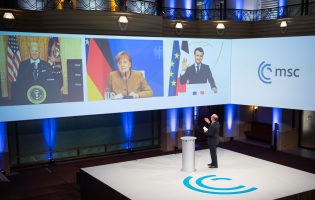
AGI Asks: What is Angela Merkel’s Transatlantic Legacy?
AGI asks: What is Chancellor Angela Merkel’s transatlantic legacy? How has the partnership fared under Merkel, and what challenges are left for her successor? John Kornblum AGI Trustee As she …

Europe’s Illusions
Although for more than 70 years common values were invoked to keep the transatlantic partnership together, now is the time to assert shared U.S.-German interests.
Germany at 60 in Europe
Amidst a major anniversary year for Germany, Senior Non-resident Fellow Dr. Jeffrey J. Anderson, Graf Goltz Professor and Director of the BMW Center for German and European Studies at Georgetown University, examines Germany’s changing role in Europe and discusses how Germany’s shifting historical memory has impacted foreign policy since the fall of the Berlin Wall. Dr. Anderson argues that there is reason to believe that a more assertive Germany, motivated more openly by national interests but still acting with and through Europe, makes for a more effective and reliable transatlantic partner for the United States.





